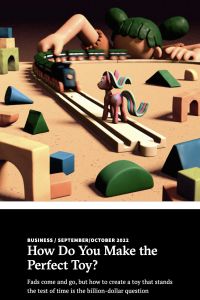Melden Sie sich bei getAbstract an, um die Zusammenfassung zu erhalten.

Melden Sie sich bei getAbstract an, um die Zusammenfassung zu erhalten.
Matthew Braga
How Do You Make the Perfect Toy?
Fads come and go, but how to create a toy that stands the test of time is the billion-dollar question
The Walrus, 2022
Was ist drin?
Some toys survive for decades, but most fizzle. Do the classics have a deeper appeal than nostalgia alone?
Recommendation
Most people can remember their favorite toy growing up, from a simple set of blocks to a Cabbage Patch Kid with eye color and hair that matched their own. But what makes a toy transcend generations and stay popular among kids, their parents and even their grandparents? Reporting for The Walrus, Matthew Braga takes a deep dive with industry experts and scientists into what exactly makes a toy a classic in this competitive, lucrative market.
Summary
About the Author
Matthew Braga is a writer and editor based in Toronto.





















Comment on this summary